The Second Machine Age: Work, Progress, and Prosperity in a Time of Brilliant Technologies
06 Jun 2017
Andrew McAfee’s TED talks (Are droids taking our jobs? and What will future jobs look like) are my go-to reference for anyone looking to understand the potential of automation and AI and how it could impact jobs and work. I started reading this book after watching the authors talk at Google, which I recommend as a good overview of what to expect from this book.
This book is a good primer on the current status and potential of automation and AI. The authors think through the possible impact of these changes and offer ideas of how to minimize damage and improve results. They follow a healthy attitude towards automation; neither cheering for it or warning about it, but rather accepting it as a likely future and thinking through its implementations.
The authors aren’t afraid to say “we don’t know” and offered honest assessment for the likelihood of their predications.
I disagree with some of the ideas, especially their critique of universal basic income. However I found some of the other ideas impressive and thought-provoking like how when humans and machines work together they can produce better results than machines on their own. The section on improving education is a recommended reading for everyone.
I recommend this book for anyone looking to understand the upcoming changes in Automation and AI whether they have read about the subject before or looking for an introduction and overview.
Quotes from the book
8%
The second half of the chess board
82%
Only self-motivated people take advantage of the freely available online courses while their peers are falling behind. This means that, unless we make sure its impact is more wide spread, digitization of education is widening the gap, not closing it
93%
If machines can do better job than humans at a certain task, pairing humans with machines can produce an even better job

